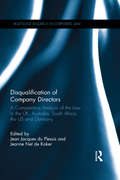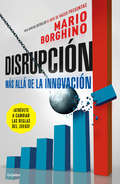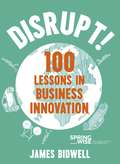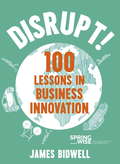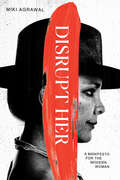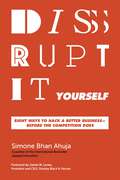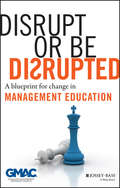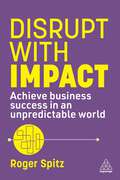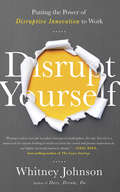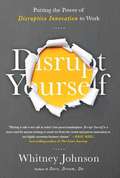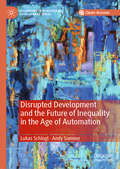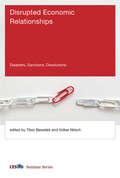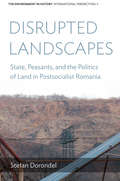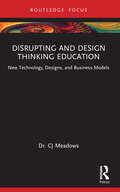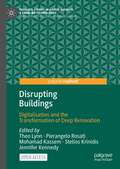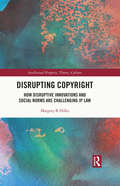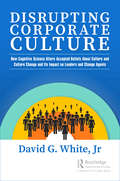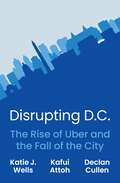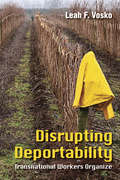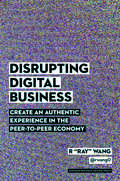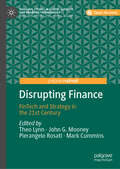- Table View
- List View
Dispute Settlement Reports 2020 Dispute Settlement Reports 2020: Volume 5, Pages 2039 to 2398 (World Trade Organization Dispute Settlement Reports)
by World Trade OrganizationThe Dispute Settlement Reports are the WTO authorized and paginated reports in English. They are an essential addition to the library of all practising and academic trade lawyers and a valued resource for students worldwide taking courses in international economic or trade law. DSR 2019: Volume 5 provides the reports on "Ukraine – Anti-Dumping Measures on Ammonium Nitrate (WT/DS493)" and on "United States – Measures Affecting Trade in Large Civil Aircraft (Second Complaint) (WT/DS353)".
Dispute Settlement Reports 2020: Volume 4, Pages 1523 to 2038 (World Trade Organization Dispute Settlement Reports)
by World Trade OrganizationThe Dispute Settlement Reports are the WTO authorized and paginated reports in English. They are an essential addition to the library of all practising and academic trade lawyers and a valued resource for students worldwide taking courses in international economic or trade law. DSR 2020: Volume 4 provides the reports on 'Australia – Certain Measures Concerning Trademarks, Geographical Indications and Other Plain Packaging Requirements Applicable to Tobacco Products and Packaging (WT/DS435, WT/DS441)'.
Dispute Settlement Reports 2021: Volume 1, 1-401 (World Trade Organization Dispute Settlement Reports)
by World Trade OrganizationThe Dispute Settlement Reports are the WTO authorized and paginated reports in English. They are an essential addition to the library of all practising and academic trade lawyers and a valued resource for students worldwide taking courses in international economic or trade law. DSR 2021: Volume 1 reports on United States - Anti-Dumping and Countervailing Duties on Ripe Olives from Spain (WT/DS577).
Disqualification of Company Directors: A Comparative Analysis of the Law in the UK, Australia, South Africa, the US and Germany (Routledge Research in Corporate Law)
by Jean Jacques du Plessis and Jeanne Nel de KokerThis book provides a clear overview of the legal rules relating to directors’ disqualification in Australia, Germany, South Africa, the UK and the US, and to highlight the differences in the disqualification regimes of these jurisdictions. The book seeks to determine whether disqualification on application should be developed further as a corporate law and corporate governance tool to ensure that individuals who have a proven record of posing a particular risk to the business community, shareholders and creditors, are indeed disqualified from being directors. The book is unique as it provides a single source where the disqualification regimes of all these jurisdictions are explored and compared. The book will appeal to scholars of corporate law, regulators and policy-makers. The book will also be of particular interest to senior managers and directors to determine precisely what the laws regarding disqualification of company directors are, and what type of behaviour might expose them to potential disqualification.
Disrupción: Más allá de la innovación
by Mario BorghinoSi eres un joven que anhela abrir un negocio, un emprendedor, empresario o presidente de una compañía que quiere encontrar la forma de crecer y revolucionar el mercado, Disrupción es para ti. Con este libro: - Aprenderás qué estrategia han usado los grandes emprendedores para crecer y cambiar el mundo. - Conocerás a detalle los secretos que hay detrás de una DISRUPCIÓN y las herramientas que necesitas aplicar. - Identificarás por qué las nuevas empresas crecen a través de la disrupción y las grandes sólo crecen comprando más empresas por el mundo. - Comprenderás el rol que tiene la tecnología digital para el crecimiento en productos y en tu diseño de negocio. - Verás que cuando integras tecnología y resuelves un problema del consumidor, evolucionas. - Descubrirás por qué los disruptores transforman sus negocios en empresas millonarias en pocos años. - Podrás ver tu negocio y las oportunidades del mercado desde una perspectiva como nunca antes la habías visto. - Recibirás consejos para pensar como LÍDER DISRUPTOR y transformar tu empresa. - Aprenderás el algoritmo que debes construir para obtener una DISRUPCIÓN y cómo aplicarlo en tu empresa. Durante los próximos años habrá un mercado más complejo y difícil de conquistar, por eso este libro no es para aquellos que quieren mejorar, es para aquellos que quieren cambiar y reinventarse. ¡Atrévete a cambiar las reglas del juego! Por el autor del bestseller El arte de hacer preguntas.
Disrupt!: 100 Lessons in Business Innovation
by James BidwellCompiled by Springwise, the global innovation discovery engine, Disrupt! explains and highlights the best, most disruptive and most useful innovation ideas of the 21st Century.The book shares which themes underpin their success and which ideas can best be used to drive creativity in your workplace, office or industry.Springwise has a huge online readership (700k page impressions a month, 31k FB followers, 62k Twitter followers and an email database of 160k names) and a reputation as the number one engine for collating and sharing cutting edge business ideas.Dan Pink describes Springwise as: 'An amazing roundup of new business ideas and surprising business models from around the world'.Seth Godin says: 'Almost too good to share!'This attractively designed book draws on their vast archive and the expertise of their editorial team to create a practical, themed overview of contemporary innovation with simple, implementable strategies for bringing more creativity to your business or idea and more disruption to your industry. It is an indispensable handbook to modern innovation.
Disrupt!: 100 Lessons in Business Innovation
by James BidwellCompiled by Springwise, the global innovation discovery engine, Disrupt! explains and highlights the best, most disruptive and most useful innovation ideas of the 21st Century, and shows which themes underpin their success and which ideas can best be used to drive creativity in your workplace, office or industry.Springwise has a huge online readership (700k page impressions a month, 31k FB followers, 62k Twitter followers and an email database of 160k names) and a reputation as the number one engine for collating and sharing cutting edge business ideas. Dan Pink describes Springwise as: 'An amazing roundup of new business ideas and surprising business models from around the world'. Seth Godin says: 'Almost too good to share!' This attractively designed book draws on their vast archive and the expertise of their editorial team to create a practical, themed overview of contemporary innovation with simple, implementable strategies for bringing more creativity to your business or idea and more disruption to your industry. It is an indispensable handbook to modern innovation.
Disrupt-Her: A Manifesto for the Modern Woman
by Miki AgrawalFrom the co-founder of THINX and hellotushy.com, start-ups collectively valued at more than $150 million, comes DISRUPT-HER, a rallying cry for women to radically question the status quo.Miki Agrawal has faced patriarchal pushback, fought girl-on-girl hate, ridden the roller coaster of building businesses as a female CEO, and even overcome an attempt to burn her for witchcraft (figuratively).In order to navigate the complicated--at times maddening--struggles of contemporary femininity, we need an unabashed manifesto for the modern woman that inspires us to move past outrage and take positive steps on the personal, professional, and societal levels.This manifesto galvanizes us to action in 13 major areas of our lives with as much fire power as possible. These are the credos we live by, the advice we give to friends, the tenets we instill in our companies and peers on a daily basis. Stories of badass female movers and shakers are shared in this book too to give you an extra jolt of "I've got this." It's a whole body F*CK YES to your work, your love, your relationships, and your mission--while doing it all authentically, unapologetically, and with full integrity.
Disrupt-It-Yourself: Eight Ways to Hack a Better Business---Before the Competition Does
by Simone Bhan Ahuja James M. LoreeDiscover eight dynamic principles to help innovation flourish from within. The shelf life of well-established companies keeps shrinking as new entrants replace old ones in rapid succession. Even brands that seemed invincible only a few years ago are in danger of being disrupted by fast-moving startups. In this unprecedented environment, how can any business stay ahead of the market? Companies can no longer assume innovation will “just happen”—it must be seeded, grown, and successfully harvested. They must disrupt themselves. In Disrupt-It-Yourself, bestselling author and innovation expert Simone Ahuja guides readers through the DIY (Disrupt-It-Yourself) system that will sustain innovation and retain DIYers, the employees—or intrapreneurs—most committed to solving the problems of the future, even if it means moving far beyond “business as usual.” Based on her experience working with Fortune 500 companies and extensive research, Ahuja identifies the intrapreneurial archetype and presents eight new principles to foster a DIY mindset and action plan. In a clear, concise style with expert advice and real-world examples, this bookprovides a new lens to help companies become faster and more fluid,offers easy options to tailor the system to each company’s unique circumstances, andpresents strategic lessons—from Keep It Frugal to Make It Permission-less—that open up the full spectrum of innovation and make it sustainable.Using the DIY approach, organizations can build their ability to innovate and create an approach for growth that harnesses the creativity and knowledge of employees at every level.
Disrupt or Be Disrupted: A Blueprint for Change in Management Education
by GMACAn evidence-based approach to improving the practice of graduate management education Compiled by the Graduate Management Admission Council (GMAC) and with contributions by administrators and professors from the top global MBA programs, this book provides business school decision-makers with an evidence-based approach to improving the practice of graduate management education. The book is designed to help navigate the pressures and create revolutionary platforms that leverage a school's unique competitive advantage in a design distinctly tailored for today's business realities. Offers a unique handbook for improving graduate management education Contains contributions from an international group of deans and professors that lead MBA programs Sponsored by GMAC, owner of the Graduate Management Admission Test (GMAT) exam used by over 5,000 programs worldwide This important resource gives academics a proven approach for improving graduate-level management programs.
Disrupt With Impact: Achieve Business Success in an Unpredictable World
by Roger SpitzDisruption's far-reaching effects are inevitable, bringing both unprecedented challenges and opportunities to creatively shape our futures.Disrupt With Impact is the ultimate guide to thriving in today's complex business landscapes. It offers strategies that will allow you to navigate uncertainty and change through strategic decision-making.Covering major challenges such as sustainability, AI, geopolitics and cybersecurity, this book is your compass for exploring the uncharted waters of the future. These paradigm shifts will redistribute trillions of dollars, presenting opportunities for immense value creation, while those clinging to business as usual face growing risks of value destruction. Through fascinating research and original frameworks, Disrupt With Impact offers the knowledge and confidence you need to lead your business through disruption.
Disrupt Yourself: Putting the Power of Disruptive Innovation to Work
by Whitney JohnsonAre you a high potential charting your course within your current organization, a leader trying to jumpstart innovative thinking in your company? Or are you ready to do something new? Consider this simple yet powerful idea: disruptive companies and ideas upend markets by doing something truly different--they see a need, an empty space waiting to be filled, and they dare to create something for which a market may not yet exist. An expert in driving innovation via personal disruption, Whitney Johnson, will help you understand how the frameworks of disruptive innovation can apply to you: if you want to be successful in unexpected ways, follow your own disruptive path. Dare to innovate. Dream big dreams. Do something astonishing. Disrupt yourself. In this book, you will learn how to apply these frameworks to building a business, career--and you. We are living in an era of accelerating disruption--those who can manage the S-curve waves of learning and maxing out will have a competitive advantage. But this is a skill set that needs to be learned. Disrupt Yourself will help people cope with the unpredictability of disruption, and use it to their competitive advantage.
Disrupted Development and the Future of Inequality in the Age of Automation (Rethinking International Development series)
by Andy Sumner Lukas SchloglThis open access book examines the future of inequality, work and wages in the age of automation with a focus on developing countries. The authors argue that the rise of a global ‘robot reserve army’ has profound effects on labor markets and economic development, but, rather than causing mass unemployment, new technologies are more likely to lead to stagnant wages and premature deindustrialization. The book illuminates the debate on the impact of automation upon economic development, in particular issues of poverty, inequality and work. It highlights public policy responses and strategies–ranging from containment to coping mechanisms—to confront the effects of automation.
Disrupted Economic Relationships: Disasters, Sanctions, Dissolutions (CESifo Seminar Series)
by Enrico SpolaoreEmpirical studies and theoretical analyses examine the causes and consequences of disruptions in cross-border economic relationships, including political conflict, economic sanctions, and institutional collapse.Cross-border economic relationships gradually strengthened in the decades after World War II; for most of the postwar period, international trade and investment have grown faster than output, a process often termed “globalization.” In recent years, however, economic relationships have grown more fragile, subject to disruption by such factors as political conflict, economic sanctions, and the dissolution of institutional arrangements. This timely CESifo volume offers empirical studies and theoretical analyses that examine the causes and consequences of these disrupted economic relationships.Contributors propose a new theoretical framework for understanding the economic impact of intergroup conflict and develop a predictive model to analyze the contagion of regional wars. They offer empirical studies of the economic effect of targeted sanctions and boycotts, including those imposed upon Iran, Russia, and Myanmar; argue provocatively that natural disasters are associated with increased international trade; analyze trade duration, finding previously identified explanatory factors to be insufficient for explaining variations in trade survival over time; and critically review the hypothesis that oil was a crucial factor in the collapse of the Soviet Union.ContributorsDaniel P. Ahn, Tibor Besedeš, Kilian Heilmann, Wolfgang Hess, Julian Hinz, Melise Jaud, Tristan Kohl, Madina Kukenova, Chenmei Li, Rodney D. Ludema, Volker Nitsch, Maria Persson, Chiel Klein Reesink, Arthur Silve, Enrico Spolaore, Martin Strieborny, Marvin Suesse, Peter A. G. van Bergeijk, Thierry Verdier, Romain Wacziarg
Disrupted Landscapes: State, Peasants and the Politics of Land in Postsocialist Romania
by Stefan DorondelThe fall of the Soviet Union was a transformative event for the national political economies of Eastern Europe, leading not only to new regimes of ownership and development but to dramatic changes in the natural world itself. This painstakingly researched volume focuses on the emblematic case of postsocialist Romania, in which the transition from collectivization to privatization profoundly reshaped the nation's forests, farmlands, and rivers. From bureaucrats abetting illegal deforestation to peasants opposing government agricultural policies, it reveals the social and political mechanisms by which neoliberalism was introduced into the Romanian landscape.
Disrupting and Design Thinking Education: New Technology, Designs, and Business Models (Routledge-Solaris Focus on Strategy, Wisdom and Skill)
by CJ MeadowsMeadows proposes an approach to the education business that begins with needs, and proposes educational and business models, supported by new technologies. This book takes a design-thinking and disruption perspective on the future of education. Beginning with shocking statistics on cost, time, and lengthy debt repayment, it presents a clear case for disruption in the education sector. It continues by examining future skills in the age of AI, machine learning, and robotics. In this new age, businesses need a new kind of workforce, and workers need to equip themselves to survive and thrive. Drawing upon tools and techniques from disruption and design-thinking, Meadows puts forward new frameworks of education, business, and technology -- all with examples of educators (and learners) already doing it today.This book provides rigorous thinking and practical guidance for professionals in the education industry and budding education entrepreneurs, as well as homeschooling parents.
Disrupting Buildings: Digitalisation and the Transformation of Deep Renovation (Palgrave Studies in Digital Business & Enabling Technologies)
by Theo Lynn Pierangelo Rosati Mohamad Kassem Stelios Krinidis Jennifer KennedyThe world’s extant building stock accounts for a significant portion of worldwide energy consumption and greenhouse gas emissions. In 2020, buildings and construction accounted for 36% of global final energy consumption and 37% of energy related CO2 emissions. The EU estimates that up to 75% of the EU’s existing building stock has poor energy performance, 85–95% of which will still be in use in 2050.To meet the goals of the Paris Agreement on Climate Change will require a transformation of construction processes and deep renovation of the extant building stock. It is widely recognized that ICTs can play an important role in construction, renovation and maintenance as well as supporting the financing of deep renovation. Technologies such as sensors, big data analytics and machine learning, BIM, digital twinning, simulation, robots, cobots and UAVs, and additive manufacturing are transforming the deep renovation process, improving sustainability performance, and developing new services and markets.This open access book defines a deep renovation digital ecosystem for the 21st century, providing a state-of-the art review of current literature, suggesting avenues for new research, and offering perspectives from business, technology and industry domains.This is an open access book.
Disrupting Copyright: How Disruptive Innovations and Social Norms are Challenging IP Law (Intellectual Property, Theory, Culture)
by Margery R HilkoNew innovations are created every day, but today’s business leaders are focused on finding disruptive innovations which are cheaper and lower performing than upmarket technologies. They create new markets, and challenge the status quo of existing technological thinking creating uncertainty both in the future of the innovation and the outcome of the market upheaval. Disruptive innovation is an influential innovation theory in business, but how does it affect the law? Several of these technologies have brought new ways for individuals to deal with copyright works while disrupting existing market expectations, while their ability to spawn social norms has presented challenges for legislation. Considering disruptive innovation as a class, this book examines innovations that have impacted copyright in the past, what lessons can be learned from how the law interacted with them, and how the law can successfully deal with them going forward. Creating comprehensive guidance that can be used when faced with disruptive innovations with the aim of more successful legislation, it considers whether copyright law itself has been disrupted through these innovations. Exploring whether disruptive innovations as a class have unique properties that necessitate action by legislators and whether these properties have the possibility to disrupt the law itself, this book theorises how the law should deal with disruptive innovations in general, going beyond a discussion of the regulation of specific innovations to develop a framework for how law makers should deal with disruptive innovations when faced by one.
Disrupting Corporate Culture: How Cognitive Science Alters Accepted Beliefs About Culture and Culture Change and Its Impact on Leaders and Change Agents
by David G. White, JrResearch in cognitive science over the last 30 years shows much of what we know about culture in the business world is based on myth, wishful thinking, outdated science, or is just plain wrong. This is why culture-shaping and change programs in organizations often amount to little more than sloganeering with minimal impact on the lived experience of employees. This book bridges the gap between the latest research on cognitive science and culture, providing a valuable guide for change leaders, CEOs, and practitioners on how to sustainably work with and change this important resource. It answers many of the major questions that have plagued culture work, such as: Why so many CEOs and management consultants preach culture change when so few culture interventions actually succeed Why CEOs persist in believing "culture starts at the top" when virtually no research in anthropology supports that claim Why most culture shaping approaches have no answer for how to affect culture in global companies Why culture doesn’t cause us to do anything, yet we persist in believing that somehow it does Why so many culture-shaping projects focus on corporate values despite the fact modern science shows why changing personal values is exceedingly difficult What we are learning about culture from the last 30 years of cognitive science gives us the foundation for far more impactful and sustainable interventions than have been possible to date. This book explains why, showing how everyday business practices well beyond HR are key to culture change. Why? Because the brain’s synaptic plasticity can only be altered through new sustained and widespread organizational habits and routines. This groundbreaking, practical guide will show you finally how to realize the full power of culture as a transformational, empowering, and competitive resource.
Disrupting D.C.: The Rise of Uber and the Fall of the City
by Katie J. Wells Kafui Attoh Declan CullenA panoramic account of the urban politics and deep social divisions that gave rise to UberThe first city to fight back against Uber, Washington, D.C., was also the first city where such resistance was defeated. It was here that the company created a playbook for how to deal with intransigent regulators and to win in the realm of local politics. The city already serves as the nation’s capital. Now, D.C. is also the blueprint for how Uber conquered cities around the world—and explains why so many embraced the company with open arms.Drawing on interviews with gig workers, policymakers, Uber lobbyists, and community organizers, Disrupting D.C. demonstrates that many share the blame for lowering the nation’s hopes and dreams for what its cities could be. In a sea of broken transit, underemployment, and racial polarization, Uber offered a lifeline. But at what cost?This is not the story of one company and one city. Instead, Disrupting D.C. offers a 360-degree view of an urban America in crisis. Uber arrived promising a new future for workers, residents, policymakers, and others. Ultimately, Uber’s success and growth was never a sign of urban strength or innovation but a sign of urban weakness and low expectations about what city politics can achieve. Understanding why Uber rose reveals just how far the rest of us have fallen.
Disrupting Defense at Anduril Industries
by Aditi Ghai James Heffelfinger Rory McDonald Timothy BuehnCase
Disrupting Deportability: Transnational Workers Organize
by Leah F. VoskoIn an original and striking study of migration management in operation, Disrupting Deportability highlights obstacles confronting temporary migrant workers in Canada seeking to exercise their labor rights. Leah F. Vosko explores the effects of deportability on Mexican nationals participating in Canada's Seasonal Agricultural Worker Program (SAWP).Vosko follows the decade-long legal and political struggle of a group of Mexican SAWP migrants in British Columbia to establish and maintain meaningful collective representation. Her case study reveals how modalities of deportability—such as termination without cause, blacklisting, and attrition—destabilize legally authorized temporary migrant agricultural workers. Through this detailed exposé, Disrupting Deportability concludes that despite the formal commitments to human, social, and civil rights to which migration management ostensibly aspires, the design and administration of this "model" temporary migrant work program produces conditions of deportability, making the threat possibility of removal ever-present.
Disrupting Digital Business
by R Ray" WangWe are no longer an economy of products and services. The digital transformation demands that we focus our attention on experiences and outcomes. Business leaders and their organizations must shift to keeping promises-no matter how their customers interact with them.But organizations no longer control the conversation. In this era of social and mobile technology, customers, employees, suppliers, and partners are in direct communication with one another. Those personal networks and the brands they're passionate about influence their decision making and their spending.The workforce has changed too. Employees expect to be able to determine when and how they will work, the technology they'll use, and the values their company will espouse.Organizations can take part in this conversation only if they recognize how and where it's happening. Resisting these changes will leave executives, managers, and their companies powerless. Organizations must pivot with and ahead of these social, organizational, and technological shifts or risk being left behind.Technology guru Ray Wang shows how organizations can surf the waves of change-how they can keep their promises. Current trends, when taken seriously, require a new way of thinking about business that includes five key areas:1. Consumerization of technology and the new C-suite2. Data's influence in driving decisions3. Digital marketing transformation4. The future of work5. Matrix commerceDigital disruption has changed how we do our work. But by mastering these trends you'll delight your customers with every interaction.
Disrupting Finance: FinTech and Strategy in the 21st Century (Palgrave Studies in Digital Business & Enabling Technologies)
by Theo Lynn John G. Mooney Pierangelo Rosati Mark CumminsThis open access Pivot demonstrates how a variety of technologies act as innovation catalysts within the banking and financial services sector. Traditional banks and financial services are under increasing competition from global IT companies such as Google, Apple, Amazon and PayPal whilst facing pressure from investors to reduce costs, increase agility and improve customer retention. Technologies such as blockchain, cloud computing, mobile technologies, big data analytics and social media therefore have perhaps more potential in this industry and area of business than any other. This book defines a fintech ecosystem for the 21st century, providing a state-of-the art review of current literature, suggesting avenues for new research and offering perspectives from business, technology and industry.

